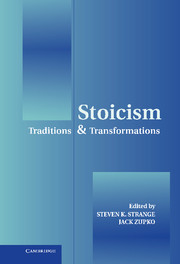Book contents
- Frontmatter
- Contents
- List of Contributors
- Acknowledgments
- List of Abbreviations
- Stoicism
- Introduction
- 1 The Socratic Imprint on Epictetus' Philosophy
- 2 The Stoics on the Voluntariness of the Passions
- 3 Stoicism in the Apostle Paul: A Philosophical Reading
- 4 Moral Judgment in Seneca
- 5 Stoic First Movements in Christianity
- 6 Where Were the Stoics in the Late Middle Ages?
- 7 Abelard's Stoicism and Its Consequences
- 8 Constancy and Coherence
- 9 On the Happy Life: Descartes vis-à-vis Seneca
- 10 Psychotherapy and Moral Perfection: Spinoza and the Stoics on the Prospect of Happiness
- 11 Duties of Justice, Duties of Material Aid: Cicero's Problematic Legacy
- 12 Stoic Emotion
- Works Cited
- Name Index
- Subject Index
1 - The Socratic Imprint on Epictetus' Philosophy
Published online by Cambridge University Press: 11 July 2009
- Frontmatter
- Contents
- List of Contributors
- Acknowledgments
- List of Abbreviations
- Stoicism
- Introduction
- 1 The Socratic Imprint on Epictetus' Philosophy
- 2 The Stoics on the Voluntariness of the Passions
- 3 Stoicism in the Apostle Paul: A Philosophical Reading
- 4 Moral Judgment in Seneca
- 5 Stoic First Movements in Christianity
- 6 Where Were the Stoics in the Late Middle Ages?
- 7 Abelard's Stoicism and Its Consequences
- 8 Constancy and Coherence
- 9 On the Happy Life: Descartes vis-à-vis Seneca
- 10 Psychotherapy and Moral Perfection: Spinoza and the Stoics on the Prospect of Happiness
- 11 Duties of Justice, Duties of Material Aid: Cicero's Problematic Legacy
- 12 Stoic Emotion
- Works Cited
- Name Index
- Subject Index
Summary
The honorable and good person neither fights with anyone himself, nor, as far as he can, does he let anyone else do so. Of this as of everything else the life of Socrates is available to us as a paradigm, who not only himself avoided fighting everywhere, but did not let others fight either.
(1.5.1–2)Now that Socrates is dead, the memory of what he did or said when alive is no less beneficial to people, or rather is even more so.
(4.1.169)The Stoic Discourses of Epictetus are conspicuously marked throughout by the figure of Socrates. No other philosopher, not even Zeno or Diogenes, is named nearly so frequently. Epictetus views Socrates as the single figure who best authorizes and exemplifies everything he is trying to give his students in terms of philosophical methodology, self-examination, and a life model for them to imitate. This strikingly explicit coincidence between Epictetus' objectives and Socrates makes the Stoicism of the Discourses particularly distinctive.
In order to take the measure of this point, we need to start from the role of Socrates in the preceding Stoic tradition. The earliest Stoic philosophers had drawn so heavily on Plato's and, to a lesser extent, Xenophon's Socrates that members of the school were happy to be called Socratics. The details cover numerous Stoic doctrines in ethics, moral psychology, and theology, including the priority of the soul's good over everything else, the unity of the virtues, the identity of virtue with knowledge, and divine providence.
- Type
- Chapter
- Information
- StoicismTraditions and Transformations, pp. 10 - 31Publisher: Cambridge University PressPrint publication year: 2004
- 1
- Cited by



